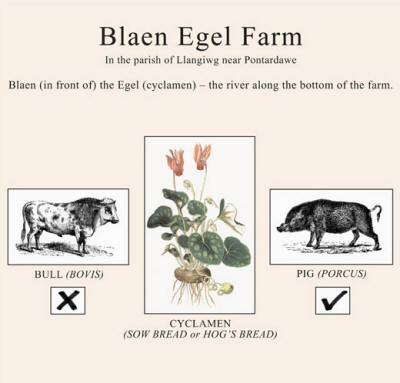Names tell of the history or significance of a place. The name of our farm, Blaen Egel describes it as being ‘in front of’ the Egel – the name of the river that runs along the bottom of the farm. However, the meaning of Egel has been less than clear. The most probable meaning, and one supported by the following conversations had with farming neighbours when we moved into the farm, is that it is ancient Welsh for the plant, named Cyclamen or Sow Bread.
Another told me - “They used to keep pigs on the fields near the river as they liked to eat the plants that grew in the nearby woods.”

Los nombres hablan de la
historia o el significado de un lugar.
El nombre de nuestra granja, Blaen Egel lo describe como "en frente" del
Egel, el nombre del río que corre a lo largo del fondo de la granja.
Sin embargo, el significado de Egel ha sido menos que claro.
El significado más probable, y respaldado por las siguientes
conversaciones que tuvimos con los vecinos agricultores cuando nos
mudamos a la granja, es que la planta se llama ciclamen o pan de cerda
en galés antiguo.
“Nunca podrás tener toros en los campos cerca del
río porque allí hay una planta que los volverá locos”.
Otro me dijo: “Solían criar cerdos en los campos cerca del río porque
les gustaba comer las plantas que crecían en los bosques cercanos”.
Tanto Cyclamen como el jugo del tubérculo son
venenosos para el hombre, pero los cerdos buscan y comen los tubérculos
con impunidad.